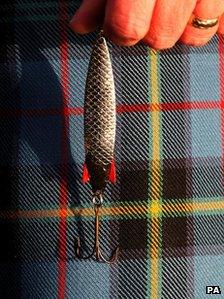Wild fish rod catches high, says Scottish government
- Published

Rod catches remain high, but net fisheries continue to decline
The number of wild salmon caught and then released in Scotland last year was the sixth highest on record, according to the Scottish government.
Recorded since 1952, the figures show 87,915 salmon were caught by rod in 2011.
Sea trout catches have declined since the 1950s, but the government said the 23,324 caught last year was 4% higher than the previous five-year average.
Numbers of salmon and trout caught in net fisheries continued to fall.
The government said catch and effort for salmon and sea trout net fisheries remained at historically low levels.
Environment Minister Paul Wheelhouse said fishing was a key part of Scotland's rural heritage and modern economy.
He said: "In addition to delivering valuable local employment the sector provides a recreational activity enjoyed by locals and visitors alike.
"Indeed, salmon fishing attracts substantial numbers of visitors to Scotland, benefiting local hotels and businesses.
"The practice of catch and release plays an important role in the continuing conservation of our freshwater fisheries. The upward trend in catch and release is therefore welcome and demonstrates that anglers are very aware of the need to sustainably fish salmon and sea trout."
Earlier this month, government figures showed farmed salmon production hit a seven year high last year.
The total production of Atlantic salmon increased by 2.5% in 2011 to 158,018 tonnes - the highest level since 2004.
The figures have also shown a small rise in brown trout from 53 tonnes in 2010 to 61 tonnes in 2011.
'Perfect salmon'
Halibut production decreased by 40.3% on the 2010 figure and by 10.1% in rainbow trout, according to the Scottish Farm Production Survey 2011.
The overall number of staff employed in the rainbow trout sector fell by 11 to 118 last year.
The Scottish Salmon Producers' Organisation (SSPO) has welcomed the Atlantic salmon figures.
Meanwhile, Argyll-based scientists are aiming to be first in the world to to locate the genes that determine how susceptible individual Atlantic salmon are to certain diseases.
Landcatch Natural Selection said the research could create the "perfect salmon" and revolutionise the fish farming industry.
The company will give a presentation on its work at the Pharmaq conference in Inverness next week.
- Published10 September 2012
- Published20 April 2012
- Published13 March 2012
- Published22 February 2012
- Published22 February 2012